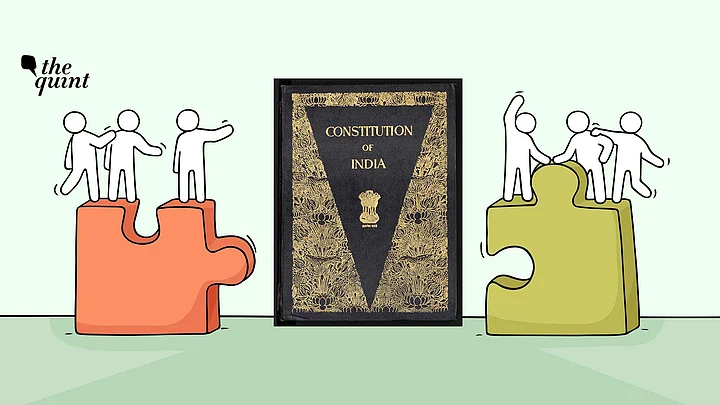The Presidency is vital for the Indian democracy’s functioning and survival. But over the years, the office has been abused to reward party loyalists, appoint lackeys, or select a token candidate from a minority or underprivileged community. This debasement of the office arises from some fundamental flaws in our Constitution, and the time has come to fix them.
A President is essential because as a parliamentary democracy, India must have a head of state in whom all powers are reposed when there’s no government. Someone needs to pick a Prime Minister after a general election or when a government falls, especially when no party has a clear majority in Parliament. A President is also needed to act as a check on government; otherwise, a government with majority control in both houses of Parliament is completely unfettered.
The President is necessary also for India’s federal set-up, to provide some control over state governments. And lastly, a President is required to act as the voice of the entire people, unlike the Prime Minister, who, in reality, represents just those who voted for his or her party or coalition.
One of the fundamental flaws in our Constitution is that it tries to create an 'elected' monarch. Walter Bagehot, an English scholar, wrote in the 1800s: “It is absurd to choose by contested party election an impartial chooser of Ministers … He would inevitably be a party man.”
Secondly, despite many attempts during its framing, the powers of the President were never made clear in the Constitution.
Vallabhbhai Patel had proposed that the President be elected directly by the people and control executive powers. But Jawaharlal Nehru insisted that the President be elected indirectly.
India now faces a bizarre situation: the country’s highest official, the President, is chosen and controlled by a subordinate, the Prime Minister.
The Attempt to Create an 'Elected' Monarch
Such important functions can be performed properly only if a President is stable in office, widely respected, and truly non-partisan. In constitutional monarchies such as the United Kingdom, the King or Queen fulfils these roles. But in democracies like India, where there’s no royalty, creating such a head of state is nearly impossible.
One of our Constitution’s fundamental flaws is that it tries to create an “elected” monarch. In the late 1800s, when some British colonies were thinking of doing the same, Walter Bagehot, England’s leading constitutional scholar, wrote, “It is absurd to choose by contested party election an impartial chooser of Ministers … He would inevitably be a party man.”
Our Constitution’s second fundamental flaw is that it makes the President subservient to the Prime Minister. Despite many attempts during its framing, the powers of the President were never made clear. An Instrument of Instructions outlining presidential powers was promised to the Constituent Assembly by BR Ambedkar himself, but it was never delivered. Instead, the Prime Minister was given the power to “aid and advise the President in the exercise of his functions”. This began a silent tug-of-war between the two offices. Then, in 1976, Indira Gandhi’s 42nd Amendment made the Presidency totally impotent. It required that the President “shall act in accordance with such advice”.
Perhaps to avoid all this, Vallabhbhai Patel proposed during the Constitution’s framing that the President be elected directly by the people and control executive powers.
His model Provincial Constitution along these lines was approved by the Constituent Assembly. But Jawaharlal Nehru insisted that the President be elected indirectly and remain a figurehead, and the Assembly reversed its decision.
Should Vallabhbhai Patel's Idea Be Reconsidered?
Because of these constitutional flaws and missteps, India now faces a bizarre situation: the country’s highest official, the President, is chosen and controlled by a subordinate, the Prime Minister. Of the 14 Presidents elected thus far, at least 10 were chosen for their loyalty to the ruling party. An extreme example of this is President Fakhruddin Ali Ahmed, who in 1975 signed Prime Minister Indira Gandhi’s proclamation of Emergency within minutes.
Recent Presidents have all been known for their service to the party and personal affinity with the Prime Minister. Pratibha Patil was called “a stooge of the Gandhi family”. Pranab Mukherjee was “a loyal person who even said that the day was the night”. And when little-known Dalit leader Ram Nath Kovind was chosen, an activist from his community quipped, “Only two people knew about his candidature, PM Narendra Modi and God.” The trend continues with Droupadi Murmu, Modi’s recent choice as the next President.
Such pliable Presidents give validity to the question of why the office is even needed. The Presidency costs the Indian taxpayer a fortune – more than Rs 100 crore each year.
To build a stronger Presidency befitting its constitutional role, India must make some reforms. One approach is to revive Patel’s idea of a directly elected President. This would create a hybrid Presidential-Parliamentary system, akin to that in France. India should also consider switching to a US-style Presidential system with its famous checks and balances.
A Few Discretionary Powers a President Must Have
At the very minimum, the Indian Presidency should be given some discretionary powers. A good place to start is the power of veto over bills, which could be overridden by, say, a two-thirds majority in Parliament. The President – not the Prime Minister – should also be allowed to appoint state Governors. And the office should be given the power to reject the Prime Minister’s nominees for the heads of the Election Commission and investigative agencies, where conflicts of interest are obvious and absurd.
History has shown that a democracy is always at risk when it has only one centre of power. The time for India to act is now.
(The author is Founder and CEO of the Divya Himachal group and author of ‘Why India Needs the Presidential System’. He can be reached @BhanuDhamija. This is a personal blog and the views expressed above are the author’s own. The Quint neither endorses nor is responsible for the same.)
